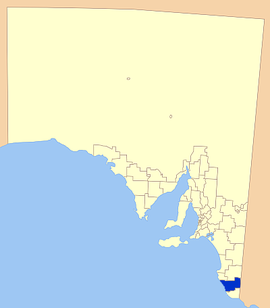District Council of Wattle Range
|
Wattle Range Council South Australia |
|||||||||||||||
|---|---|---|---|---|---|---|---|---|---|---|---|---|---|---|---|

Position of the Wattle Range Council
|
|||||||||||||||
| Coordinates | 37°27′55″S 140°30′00″E / 37.4653°S 140.4999°ECoordinates: 37°27′55″S 140°30′00″E / 37.4653°S 140.4999°E | ||||||||||||||
| Population | 11,460 (2015 est) | ||||||||||||||
| • Density | 2.9209/km2 (7.565/sq mi) | ||||||||||||||
| Established | 1997 | ||||||||||||||
| Area | 3,923.5 km2 (1,514.9 sq mi) | ||||||||||||||
| Mayor | Peter Gandolfi | ||||||||||||||
| Council seat | Millicent | ||||||||||||||
| Region | Limestone Coast | ||||||||||||||
| State electorate(s) | MacKillop, Mount Gambier | ||||||||||||||
| Federal Division(s) | Barker | ||||||||||||||
 |
|||||||||||||||
| Website | Wattle Range Council | ||||||||||||||
|
|||||||||||||||
Wattle Range Council is a local government area in the Limestone Coast region of South Australia. It stretches from the coast at Beachport east to the Victorian border. The estimated population of the council area is about 11,669 people.
The council is divided into four wards; Kintore, Riddoch, Sorby Adams and Corcoran wards, with two or more councillors representing each ward. The council seat is located at Millicent.
The aboriginal people of the region were composed of five powerful tribes, each occupying its own territory which was strictly defined, and territorial rights guarded jealously. Each had different dialects and the names of the tribes were Booandik, Pinegunga, Mootatunga, Wichitunga and Polingunga, of which the first was the most powerful. The tract of country occupied by the Booandik extended from the mouth of the Glenelg River to Rivoli Bay North (Beachport) for about 30 miles inland.
European settlers first moved into the area in the late 1840s, and by the 1860s opened up tracts of land for farming cereal crops. Beachport became an important port during the 1880s, further increasing the population of the area. The first local government areas were set up around the three towns of Millicent, Penola and Beachport in the late 19th century, with each operating independently of each other until 1997.
...
Wikipedia
